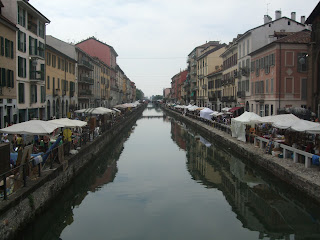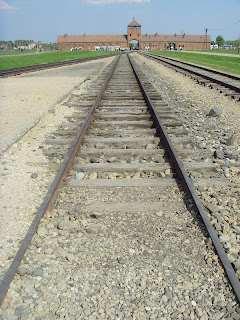.jpg) This
final week has been filled with crazy Irish fans for Euro 2012, goodbyes and
collecting all the final documents to finish our Erasmus experience. Now that
the Euro 2012 has begun in Poznań, the city is buzzing with fans from the four
countries playing in the main stadium – Ireland, Italy, Spain and Croatia. I want
this final blog to be a reflection of what I have learnt and experienced over
the last four months within the three categories; professional, cultural and
personal. I also want to end with some suggestions and helpful tips for those
students who might want to come to Poznań on Erasmus in the future!
This
final week has been filled with crazy Irish fans for Euro 2012, goodbyes and
collecting all the final documents to finish our Erasmus experience. Now that
the Euro 2012 has begun in Poznań, the city is buzzing with fans from the four
countries playing in the main stadium – Ireland, Italy, Spain and Croatia. I want
this final blog to be a reflection of what I have learnt and experienced over
the last four months within the three categories; professional, cultural and
personal. I also want to end with some suggestions and helpful tips for those
students who might want to come to Poznań on Erasmus in the future!
PROFESSIONAL
The
main benefit from working in the International school of Poznań has been learning how
to include children with English as an Additional Language and multiple cultures
within the classroom setting (GTCNI Competencies 8 and 21, 2006). Although I
have found it can be a slow and difficult process for many pupils and teachers,
the rewards outweigh the worries and frustrations along the way. It has made me
appreciate the Northern Ireland Curriculum (2007) and the lifelong learning skills
it tries to equip children with. It has been a benefit to step outside what I
am used to and reflect on how I teach and how to make it more beneficial for
children. I hope that next year I can put my learning into practise.
has been learning how
to include children with English as an Additional Language and multiple cultures
within the classroom setting (GTCNI Competencies 8 and 21, 2006). Although I
have found it can be a slow and difficult process for many pupils and teachers,
the rewards outweigh the worries and frustrations along the way. It has made me
appreciate the Northern Ireland Curriculum (2007) and the lifelong learning skills
it tries to equip children with. It has been a benefit to step outside what I
am used to and reflect on how I teach and how to make it more beneficial for
children. I hope that next year I can put my learning into practise.
After
being immersed in a new culture it has made me appreciate my own even though it
has its complications. Poland is a beautiful country which has a strong sense
of tradition. I like how their customs involve the community and bring people
together. I think it is a shame that so many of Northern Irelands traditions
are separated due to politics and religion, however, it doesn’t make it any
less of my own. I have enjoyed travelling to observe the different cultures of
the countries I have travelled too with DarÓma and think it has been the biggest
reward of my time spent on Erasmus, as well as meeting my new friends.
Spending
time away from my family and friends I have learnt to be more independent and
sure of myself. I wanted to learn to be more decisive and how to budget and
although I like to spend money I have learnt to save for the things I need too.
I enjoyed having time out of my comfort zone and having experiences I would not
have got at home, like learning a new language and travelling to many different
countries. I would recommend Erasmus to anyone, and although it can be
difficult at times, the positives far outweigh any negatives or difficulties
you have along the way. I have also gained two great friends from my university
course who I didn’t know as well before but can now rely on and have fun with.
SUGGESTIONS
AND TIPS
1. Before coming over to Poland email all the professors of the classes
you want attend to register for them. You will have two weeks to decide whether
you want to stay in the classes or change however, attendance does count.
2. Travel – travelling by train is half price if you are under twenty six
and you can get to a wide range of locations from Poland e.g. Krakow, Warsaw,
Vienna, Prague etc. I would encourage you to save a little extra for this.
3. If you are good at languages it is good to go for the six
or ten hour course of Polish however, if you are not go for the four hours. We
did six and were terrible, this made it very hard to enjoy learning the
language and we lost motivation.
4. When you are choosing your
university dorms chose either Jagienka
or Zbyszko. Jowita has a better location but
the rooms are in bad condition and you will share a bathroom with three other
people which can be locked all day.
5. When you arrive in the dorms
there is no oven, kettle, toaster etc, there is only four hobs and a sink,
(with a fridge in your room) so be
prepared to pay for utensils and essentials or bring your own.
6.
Visit:
- The Concentration Camp, Fort VII
- Malta Lake (in the winter go skiing because it will then have real snow)
- Stary Rynek:- At 12 noon see the goat chimes at city hall (it will be an anti climax however, if you live in Poznan it is a must)
Look to previous blogs for more
ideas!
If you are thinking of going to
Poznań on Erasmus please get in touch with DarÓma, Michael or I as we will be
happy to answer any questions or help with more suggestions!

.jpg)
.jpg)






































